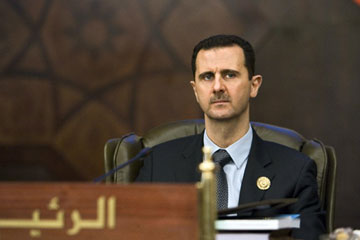
President Bashar al-Assad of Syria presides over the annual Arab summit meeting in Damascus on Saturday, March 29, 2008.
(4 of 4)
Western governments were disarmed by a leader who seemed more dweeb than dictator. On the eve of his first state visit to the U.K., in December 2002, British diplomats sought, unsuccessfully, to have the Queen bestow upon him an honorary knighthood. Italy did grant him its highest honor--the Order of Merit of the Italian Republic. (It was revoked last year.) American observers, mindful of Syria's close ties with the Lebanese terrorist group Hizballah, were warier of the new leader in Damascus--and they grew warier still when he turned a blind eye to Arab jihadists using his country as a staging ground for operations against U.S. troops in Iraq from 2003 to 2007. Even so, today's Secretary of State John Kerry, then chairman of the Senate Foreign Relations Committee, met Assad several times, visiting him in Damascus as recently as 2009. Kerry developed a good relationship with Assad and in a question-and-answer session following a speech the Senator delivered on March 16, 2011--the day after the start of the protests that would morph into Syria's civil war--Kerry expressed optimism that Assad would improve ties with the U.S.
But David Lesch, a history professor at Trinity University in Texas who met with Assad regularly from 2004 to 2009 in the process of writing two books about him and Syria, says his fondness for Western influences--like Phil Collins--was deceptive. It helped form an image of him as a pro-Western reformer, Lesch says, "when in fact he was a child of the Arab-Israeli conflict, a child of the Cold War and a child of Hafez."
Like his father, Assad eventually developed a taste for the cult of personality. The posters he had ordered taken down would be replaced by new ones showing the young President. "For his 2007 're-election'--he was the only one on the ballot--there were pictures of him everywhere, [and] he won the referendum with 97% of the vote," says Jon Alterman, a Middle East expert at the Center for Strategic and International Studies in Washington, who twice met with Assad in Damascus. Lesch says he asked Assad about the 97% vote and "half expected him to revert back to the unassuming, unpretentious nature he'd come into office with and dismiss it, but he embraced it. He said it showed people loved him, adored him, needed him. It showed me he'd be President for life."
And he may yet be. In the third year of the war his military remains strong and well supplied, and it has managed to take back some of the key cities previously lost to the rebels. Besides, few of the voices in the West now arguing for air strikes against Syria want Assad to be toppled, lest the power vacuum be filled by Islamist rebels far more extreme than those who tried to kill his father. That fear also unites many ethnic and sectarian minorities behind the dictator. "I really do think that if an election were held today in Syria, a legitimate one, Assad would still win a majority," Lesch says. "Not because people love him or the regime, but because they don't see an alternative." Whatever the severity of the punishment President Obama hands out to the man who sees himself as Syria's great protector, Assad will cling to the lesson he learned that day 33 years ago: to survive is to win.
